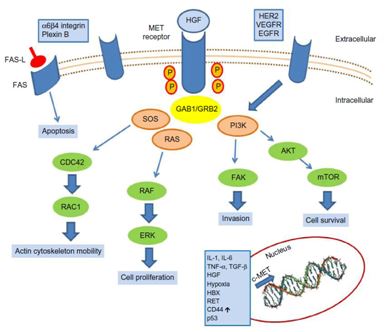MET
 Mesenchymal-epithelial transition (MET), also known as HGFR or AUTS9, is a member of the receptor tyrosine kinase family of proteins, encoded by proto-oncogene MET. The preproprotein is proteolytically processed to produce alpha and beta subunits linked by disulfide bonds, as a result of the production of mature receptor. Functionally, MET involves in oncogenesis and progression of numerous tumors by binding to its ligand, hepatocyte growth factor (HGF), inducing dimerization and activation of the receptor, which plays a key role in cellular survival, embryogenesis, and cellular migration and invasion.
Mesenchymal-epithelial transition (MET), also known as HGFR or AUTS9, is a member of the receptor tyrosine kinase family of proteins, encoded by proto-oncogene MET. The preproprotein is proteolytically processed to produce alpha and beta subunits linked by disulfide bonds, as a result of the production of mature receptor. Functionally, MET involves in oncogenesis and progression of numerous tumors by binding to its ligand, hepatocyte growth factor (HGF), inducing dimerization and activation of the receptor, which plays a key role in cellular survival, embryogenesis, and cellular migration and invasion.
The MET is widely expressed in multiple human tissues, such as brain, colon, duodenum, endometrium, fat, gallbladder, kidney, liver, lung, placenta, stomach, thyroid, urinary bladder and so on. It is proved that the MET is associated with the progression of various diseases, including papillary renal cell carcinoma, hepatocellular carcinoma, and various head and neck cancers. And it has been indicated that overexpression of MET is found in head and neck cancers and it can be considered as a promising target to treat diseases.
Gene ID: 4233
UniProt ID: P08581
If you can’t find your product on this list? Please directly send email to .
For Research Use Only. NOT FOR CLINICAL USE.
Online Inquiry
Welcome! For price inquiries, please feel free to contact us through the form on the left side. We will get back to you as soon as possible.
